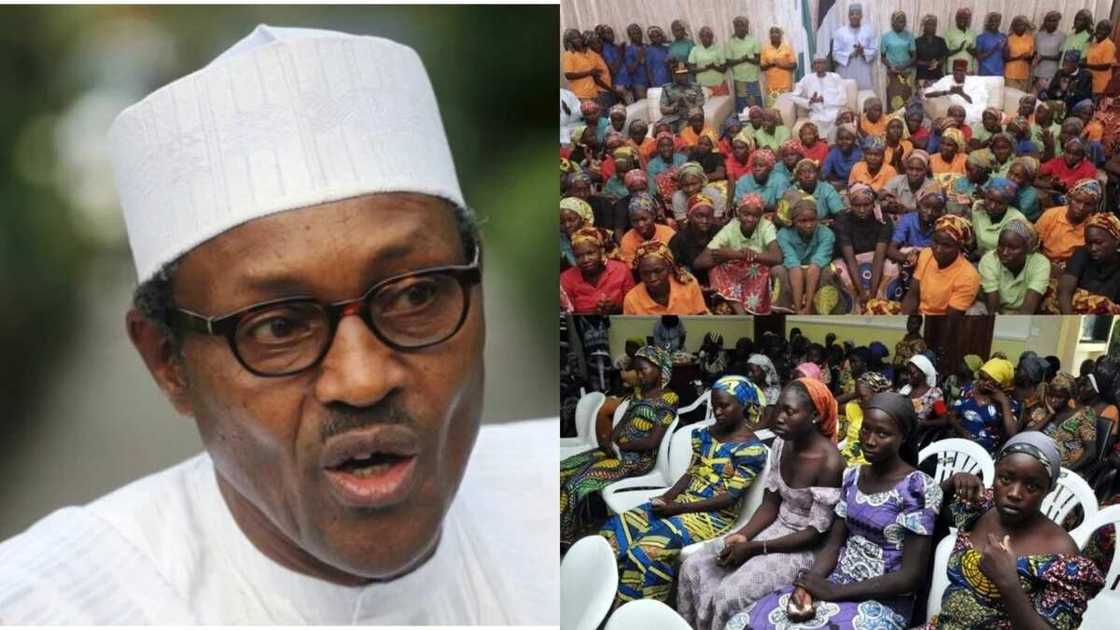Untold story of Chibok girls’ abduction and how they were swapped with Boko Haram fighters
- On May 7 the Nigerian government confirmed the release of 82 Chibok girls after they have spent three years in captivity of the dreaded Boko Haram.
- The Chibok girls were abducted from their hostel in Government Secondary School in Chibok, Borno state on April 7, 2014 while preparing for their final examinations
- The abduction of the girls by the Boko Haram terror group had sparked global outrage
- The kidnap of the Chibok girls also led to a worldwide movement that called for the return of the girls
The dateline of Chibok girls’ abduction and how the federal government was able to swapped them is highlighted below:
Legit.ng gathered that on 14th April, 2014, 276 girls were abducted from the Government Secondary School, Chibok, Borno state, by the terrorist group Boko Haram. Fifty-seven (57) of them escaped from captivity shortly after the kidnap, while being transported by the terrorists, leaving 219 girls missing.
READ ALSO: 5 Boko Haram members swapped for 82 Chibok girls – Negotiator
12th June, 2015: President Buhari, newly-sworn-in as President of Nigeria, met with some of the parents of the abducted Chibok girls. Also present at the meeting are the Wife of the President, Hajia Aisha Muhammadu Buhari, and the Wife of the Vice President, Mrs Dolapo Osinbajo.
17th July, 2015: The Department of State Services (DSS) opened negotiations with the group holding the Chibok girls. In return for the release of some of these girls, the group made certain demands, including the release of some of their fighters in government custody. Security agencies informed President Buhari of these demands. The President assented, believing in the primacy of the safe return of the girls.

Legit.ng had previously reported that 82 Chibok girls were rescued by the troops fighting Boko Haram in Maiduguri, Borno state.
Last week of July 2015 and 1st week of August 2015: DSS notified sister security agencies of negotiations, and presidential approval. Nigerian Army and Nigerian Air Force sent specialists to commence detailed arrangements for the swap: work out logistics details, such as the number of persons (girls and detainees) to be swapped; the vehicles and aircraft required, necessary safeguards, and location of the swap.
1st August, 2015: Commencement of proceedings for the swap, following final approval by President Buhari.
4th August, 2015: Team of swap facilitators was transported to Maiduguri, Borno state. The Team was able to prove its sincerity to the girls’ captors. All things were in place for the already mutually-agreed swap; expectations were high.
At the last minute, the captors issued a new set of demands, never previously discussed or negotiated prior to the movement to Maiduguri. The new development stalled what would have been the first release process of the Chibok girls.
13th November, 2015: Fresh negotiation process initiated with the girls’ captors. It became clear that factionalisation within Boko Haram was posing a challenge to the negotiation efforts. Also some of the Boko Haram commanders instrumental to the initial negotiations have since died, in combat or as a result of rifts within the group. By the end of November 2015, it becomes clear that the factionalisation of Boko Haram is deep enough to derail the negotiation process.
December 2015: A third negotiation process commenced. Failed to achieve results because of the unrealistic demands by Boko Haram. The Nigerian Government continued to explore negotiation opportunities.
January 2016: President Buhari met with the parents of the abducted Chibok girls, in Abuja.
READ ALSO: Girls refusing to come home should be forced out –Chibok leaders
April 2016: In his message to the parents of the girls on the 2nd anniversary of the abduction, President Buhari assured that “the Federal Government and security agencies will continue to explore all possible options for the safe return of the girls.”
May 2016: Amina Ali Nkeki escapes from Boko Haram. She is the first of the abducted girls to find freedom, in more than two years.
October 2016: 21 of the abducted girls were released by Boko Haram, following another round of negotiations by the Nigerian government, with the support of local and international partners.
November 5, 2016: Another Chibok girl, Maryam Ali Maiyanga, found freedom.
December 2016: The rescued girls visited Chibok to celebrate Christmas with their families.
December 23, 2016: The Nigerian Army captures Camp Zairo, Boko Haram’s spiritual and operational Headquarters in the Sambisa Forest, Borno state
January 5, 2017: Another Chibok girl, Rakiya Abubakar — Number 24 — was rescued.
January 2017: The rescued girls were handed over to the Ministry of Women Affairs by the Department of State Security, to commence remedial education and vocational training in Abuja.
April 11, 2017: Vice President Yemi Osinbajo, in a Media Chat disclosed that the Federal Government is in advanced negotiations with Boko Haram for the release of another batch of Chibok girls.
April 2017: President Buhari, in his message to commemorate the third anniversary of the abduction of the Chibok Girls, reiterated his total commitment to the safe return of the girls. He said:
“Like I have repeatedly said, the Federal Government is willing to bend over backwards to secure the release of the remaining Chibok girls. We have reached out to their captors, through local and international intermediaries, and we are ever ready to do everything within our means to ensure the safe release of ALL the girls.”
READ ALSO: Amid controversy, prominent Nigerian lawyers reveal why Osinbajo’s acting presidency is automatic
May 2017: A new batch of Chibok girls, numbering 82, was released following successful negotiations between the Nigerian Government and the girls’ captors.
September 2017: The first batch of Chibok girls will take up Federal Government Scholarships for their Secondary School education.
Watch this Legit.ng video below of kids that survived Boko Haram attacks
Source: Legit.ng

